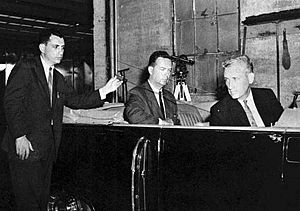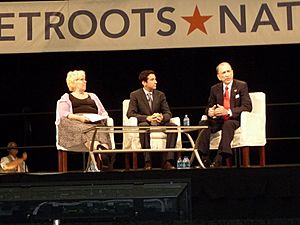Arlen Specter facts for kids
Quick facts for kids
Arlen Specter
|
|
|---|---|
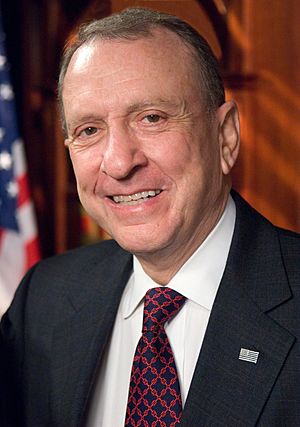
Specter c. 2007
|
|
| United States Senator from Pennsylvania |
|
| In office January 3, 1981 – January 3, 2011 |
|
| Preceded by | Richard Schweiker |
| Succeeded by | Pat Toomey |
| Chair of the Senate Judiciary Committee | |
| In office January 3, 2005 – January 3, 2007 |
|
| Preceded by | Orrin Hatch |
| Succeeded by | Patrick Leahy |
| Chair of the Senate Veterans' Affairs Committee | |
| In office January 3, 2003 – January 3, 2005 |
|
| Preceded by | Jay Rockefeller |
| Succeeded by | Larry Craig |
| In office January 3, 1997 – June 6, 2001 |
|
| Preceded by | Alan K. Simpson |
| Succeeded by | Jay Rockefeller |
| Chair of the Senate Intelligence Committee | |
| In office January 3, 1995 – January 3, 1997 |
|
| Preceded by | Dennis DeConcini |
| Succeeded by | Richard Shelby |
| 19th District Attorney of Philadelphia | |
| In office January 3, 1966 – January 7, 1974 |
|
| Preceded by | Jim Crumlish |
| Succeeded by | Emmett Fitzpatrick |
| Personal details | |
| Born | February 12, 1930 Wichita, Kansas, U.S. |
| Died | October 14, 2012 (aged 82) Philadelphia, Pennsylvania, U.S. |
| Political party | Democratic (1951–1965, 2009–2012) Republican (1965–2009) |
| Spouse |
Joan Levy
(m. 1953) |
| Children | 2 |
| Alma mater | University of Pennsylvania (BA) Yale University (LLB) |
| Signature |  |
| Military service | |
| Allegiance | |
| Branch/service | |
| Years of service | 1951–1953 |
| Rank | |
Arlen Specter (February 12, 1930 – October 14, 2012) was an American lawyer and politician. He served as a United States Senator for Pennsylvania from 1981 to 2011. Specter was first a Democrat, then a Republican, and later switched back to the Democratic Party. He was the longest-serving senator from Pennsylvania, representing the state for 30 years.
Specter was born in Wichita, Kansas. He graduated from the University of Pennsylvania and served in the United States Air Force during the Korean War. After law school, he became a lawyer. He worked for the Warren Commission, which investigated the assassination of John F. Kennedy. In 1965, Specter was elected District Attorney of Philadelphia, a job he held until 1973.
During his 30 years in the Senate, Specter was known for his middle-ground political views. He led the Senate Judiciary Committee from 2005 to 2007. In 2006, Time magazine named him one of America's Ten Best Senators. Specter lost his re-election bid in 2010 and was succeeded by Pat Toomey. He died in 2012 from complications of non-Hodgkin's lymphoma.
Contents
Early Life and Education
Arlen Specter was born in Wichita, Kansas. He was the youngest child of Lillie and Harry Specter. His parents were Jewish immigrants from Ukraine. The family later moved to Russell, Kansas, where he finished high school in 1947. Another famous politician, Bob Dole, also grew up in Russell.
Specter's father served in World War I. During the Great Depression, his father worked as a fruit seller, tailor, and junkyard owner. After high school, Arlen Specter studied at the University of Oklahoma. He then transferred to the University of Pennsylvania, where he studied international relations and graduated in 1951.
Military Service
During the Korean War, Specter served in the United States Air Force. He was in the Air Force from 1951 to 1953. He became a first lieutenant and worked as an officer in the Air Force Office of Special Investigations.
Early Legal Work and Family Life
In 1953, Arlen Specter married Joan Levy. She later became a member of the Philadelphia City Council. They had two sons. Specter graduated from Yale Law School in 1956. He also worked as an editor for the Yale Law Journal. After law school, he started his own law firm. He later became an assistant district attorney.
Early Political Career
Working with the Warren Commission
Specter worked for the Warren Commission. This group investigated the assassination of President John F. Kennedy. He helped develop the "single-bullet theory." This theory suggested that one bullet caused wounds to both President Kennedy and Texas Governor John Connally. This idea was important because it meant there was likely only one shooter, not a conspiracy. Later, another committee agreed that the "single-bullet theory" was consistent with their findings.
First Elections
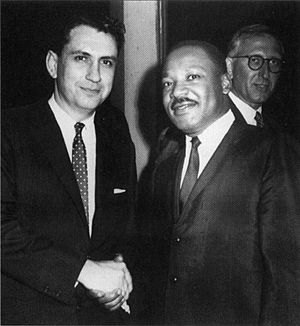
In 1965, Specter ran for Philadelphia district attorney. He switched from the Democratic Party to the Republican Party to run. He won the election. He served two four-year terms as district attorney. In 1967, he ran for mayor of Philadelphia but lost. After leaving the district attorney's office, he ran for the U.S. Senate in 1976 but was defeated. In 1978, he ran for Governor of Pennsylvania and lost again. After working as a private lawyer for a few years, Specter ran for the U.S. Senate again in 1980. This time, he won and started his Senate career in January 1981.
Senate Career
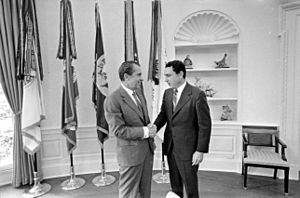
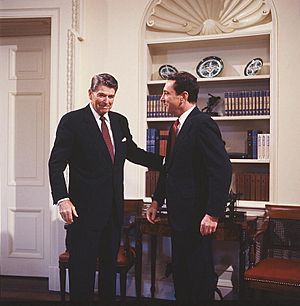
In 1988, Specter helped create a change to the Fair Housing Act. This law stops unfair treatment in housing based on things like disability or having children. The change made it easier to enforce the law. In 1998 and 1999, Specter disagreed with his Republican Party about the impeachment of President Bill Clinton. He believed Clinton did not get a fair trial.
In 1999, Specter was one of only four Republican senators to vote for the Comprehensive Test Ban Treaty. This treaty aimed to stop underground nuclear testing.
In 2002, Specter voted to allow the Iraq War. In 2003, a political newsletter called Specter a "vanishing breed of Republican moderates." They said he focused on "Pennsylvania first" politics, meaning he put his state's needs first.
After the 2004 election, Specter became well-known for his comments about the Supreme Court. He was worried about the types of judges President George W. Bush might choose. Specter became the chairman of the Senate Judiciary Committee in 2005.

In 2006, a change to the USA PATRIOT Act was signed into law. Specter had written a part of this change. It allowed the Bush administration to appoint temporary U.S. attorneys without Senate approval. Specter later said he did not intend for this to happen.
Specter was also critical of President Bush's program that allowed the government to listen to U.S. citizens' phone calls without a warrant. He called it "inappropriate" and "wrong." He held hearings to question officials about the program.
During the 2007-2008 National Football League season, Specter wrote to the NFL commissioner. He asked about the destruction of tapes related to the New England Patriots' "Spygate" scandal. Specter was a big fan of the Philadelphia Eagles.
Starting in 2007, Specter worked on a law to help military members. This law would allow service members convicted in military courts to appeal their cases to the U.S. Supreme Court.
In 2009, Specter was one of only three Republicans to support the American Recovery and Reinvestment Act of 2009. This bill, also known as the "Stimulus Bill," was supported by President Barack Obama. Specter's support led some Republicans to call for his removal from office.
Specter also helped make sure the Stimulus Act gave an extra $10 billion to the National Institutes of Health. In 2009, he led a hearing about whether the government should fund a national vaccine center.
In April 2009, Specter switched from the Republican Party to the Democratic Party. He said the Republican Party had moved too far to the right for him. He also felt it would be hard to win the Republican primary election.
In October 2009, Specter called for ending the Defense of Marriage Act. He had supported this law in 1996. In November 2009, Specter introduced a bill to require televising U.S. Supreme Court proceedings. He believed the public should be able to see and hear the arguments.
Specter's time in the Senate ended on January 3, 2011. He lost the Democratic primary election to Joe Sestak.
Committee Roles
Specter held important leadership roles in the Senate. He was chairman of the Senate Select Committee on Intelligence from 1995 to 1997. He then chaired the Committee on Veterans Affairs from 1997 to 2001 and again from 2003 to 2005. He also chaired the Judiciary Committee from 2005 to 2007.
Campaigns
In 1980, Specter became the Republican candidate for Senate. He won the election. He was re-elected four more times: in 1986, 1992, 1998, and 2004. In 2010, he ran for re-election as a Democrat but lost in the primary election.
1996 Presidential Campaign
On March 31, 1995, Specter announced he would run for President of the United States. He wanted to offer a different choice from the very conservative candidates in the Republican Party. His campaign focused on balancing the government's budget and strict crime laws. He ended his campaign before the primary elections began and supported Bob Dole.
2004 Campaign
In 2004, Specter faced a tough challenge in the Republican primary election. He was challenged by a more conservative congressman, Pat Toomey. Many people saw this as a fight between the moderate and conservative parts of the Republican Party. Most Republican leaders supported Specter. President George W. Bush also supported him. Specter won the primary election by a small margin. After that, he easily won the general election against the Democratic candidate, Joe Hoeffel.
2010 Campaign
Specter planned to run for re-election in 2010 as a Republican. However, polls showed he was behind his likely Republican challenger, Pat Toomey. On April 28, 2009, Specter announced he was switching to the Democratic Party. He said the Republican Party had become too conservative for him.
In February 2010, the Pennsylvania Democratic Party supported Specter. However, Joe Sestak went on to win the Democratic primary election in May. After the primary, Specter supported Sestak in the general election. Sestak lost to Pat Toomey.
Political Views
After switching parties, Specter often voted with Democrats. As a Republican, he had often voted with both parties.
LGBT Rights
Specter supported LGBT rights. He voted against job discrimination based on sexual orientation. He also supported the Matthew Shepard Act, which protects people from hate crimes. Specter did not support same-sex marriage but was against a federal ban on it. He supported civil unions. He also changed his mind about the Defense of Marriage Act, which he had once supported. Specter voted to end "Don't Ask, Don't Tell," a policy that affected gay people in the military.
Gun Control
Specter was generally against most gun control measures. He voted against the Brady Bill, which requires background checks for gun purchases. He also voted against bans on certain types of weapons.
Affirmative Action
He supported affirmative action, which aims to help groups that have faced discrimination. He voted for the Civil Rights Act of 1991.
Civil Rights and Supreme Court
Specter voted to create Martin Luther King Jr. Day as a federal holiday. He also voted for the Civil Rights Restoration Act of 1987. Specter voted against some Supreme Court nominees but supported others, like John Roberts and Samuel Alito.
Tax Cuts and Minimum Wage
In 1995, he was the only Republican to vote to limit tax cuts to people with lower incomes. He also supported increasing the federal minimum wage.
Immigration
Specter supported a "pathway to citizenship" for undocumented immigrants. He also supported a "guest worker program." In 2006, he introduced a bill called the Comprehensive Immigration Reform Act of 2006. The Senate passed it, but it did not become law.
Health Care Reform
Specter believed that a government-run health care plan should be considered. He voted for the Patient Protection and Affordable Care Act, a major health care bill passed by the Senate.
In 2012, Specter received an award for his work in expanding mental health care.
Privacy and Computers
In 2010, Specter became concerned about privacy after a school secretly took webcam photos of students at home. He said that new federal laws were needed to protect electronic privacy. He introduced a bill to make it illegal to secretly record visual images inside someone's home.
Post-Senate Career
After leaving the Senate, Specter taught a course at the University of Pennsylvania Law School. He taught about the relationship between Congress and the U.S. Supreme Court.
Arlen Specter Center for Public Service
In 2011, Specter donated nearly 2,700 boxes of his historical papers and items to Philadelphia University. This collection includes materials from his time as district attorney and senator. The collection will be managed by the University of Pittsburgh and will support The Arlen Specter Center for Public Policy at Philadelphia University. This center will help people better understand public policy issues.
Arlen Specter US Squash Center
US Squash built a new squash center in Philadelphia named the Arlen Specter US Squash Center. Construction began in 2019 and finished in 2021.
Illness and Death
On February 16, 2005, Specter announced he had been diagnosed with Hodgkin's lymphoma, a type of cancer. He continued to work in the Senate while getting treatment. His cancer returned in 2008, and he had more treatment.
On August 28, 2012, it was announced that Specter was battling a "serious form of cancer" again. He died from complications of non-Hodgkin's lymphoma on October 14, 2012, at his home in Philadelphia. He was 82 years old.
Many people, including President Obama, expressed their sadness. Specter was respected for his work for Pennsylvania and the country. He was the longest-serving U.S. Senator from Pennsylvania. As a sign of respect, President Obama ordered U.S. flags to be lowered to half-staff on the day of his burial.
See also
 In Spanish: Arlen Specter para niños
In Spanish: Arlen Specter para niños
- List of American politicians who switched parties in office
- List of United States senators who switched parties
- List of Jewish members of the United States Congress
Images for kids
 | Sharif Bey |
 | Hale Woodruff |
 | Richmond Barthé |
 | Purvis Young |


